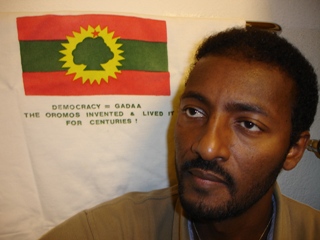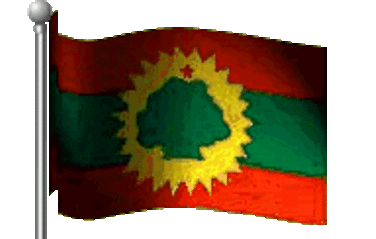Restrictions on humanitarian assistance to the Somali Region (known as the Ogaden) continued. The government engaged in sporadic armed conflict against the Ogaden National Liberation Front (ONLF) and both forces perpetrated human rights abuses against civilians. Ethiopian troops fighting insurgents in Somalia in support of the Transitional Federal Government (TFG) committed human rights abuses and were reported to have committed war crimes. Security forces arrested members of the Oromo ethnic group in Addis Ababa and in the Oromo Region towards the end of the year. Independent journalists continued to face harassment and arrest. A number of political prisoners were believed to remain in detention and opposition party leader Birtukan Mideksa, who was pardoned in 2007, was rearrested. A draft law restricting the activities of Ethiopian and international organizations working on human rights was expected to be passed by parliament in 2009. Ethiopia remained one of the world’s poorest countries with some 6.4 million people suffering acute food insecurity, including 1.9 million in the Somali Region.
Background
FEDERAL DEMOCRATIC REPUBLIC OF ETHIOPIA- Head of state: Girma Wolde-Giorgis- Head of government: Meles Zenawi- Death penalty: retentionist- Population: 85.2 million- Life expectancy: 51.8 years- Under-5 mortality (m/f): 151/136 per 1,000- Adult literacy: 35.9 per cent
The Eritrea-Ethiopia Boundary Commission completed its mandate in October, despite Ethiopia failing to implement its ruling, and the UN Security Council withdrew the UN Mission in Ethiopia and Eritrea (UNMEE) in the wake of Eritrean obstruction of its operations along the Eritrea/Ethiopia border.
Thousands of Ethiopian armed forces remained in Somalia to support the TFG in armed conflict against insurgents throughout most of the year. Accusations of human rights violations committed by Ethiopian forces continued in 2008. Insurgent factions stated that they were fighting to force Ethiopia’s withdrawal from Somalia. A phased plan for Ethiopian withdrawal was included in a peace agreement signed by the Alliance for the Re-Liberation of Somalia-Djibouti and TFG representatives in late October. Ethiopian forces began to withdraw late in the year, but had not withdrawn from Somalia completely by the end of the year.
The government faced sporadic armed conflict in the Oromo and Somali regions, with ONLF members also implicated in human rights abuses against civilians. Ethiopian opposition parties in exile remained active in Eritrea and in other countries in Africa and Europe.
“Ethiopian forces attacked the al-Hidya mosque in Mogadishu killing 21 men…”
Divisions split the opposition Coalition for Unity and Democracy (CUD) party, leading to the emergence of new opposition parties, including the Unity for Democracy and Justice Party (UDJP) led by former judge Birtukan Mideksa. She was one of more than 70 CUD leaders, journalists and civil society activists convicted, then pardoned and released in 2007.
Suicide bombers attacked Ethiopia’s trade mission in Hargeisa, Somaliland, on 29 October killing several Ethiopian and Somali civilians.
Prisoners of conscience and other political prisoners
A number of political prisoners, detained in previous years in the context of internal armed conflicts or following contested elections in 2005, remained in detention.
Bekele Jirata, General Secretary of the Oromo Federalist Democratic Movement party, Asefa Tefera Dibaba, a lecturer at Addis Ababa University and dozens of others from the Oromo ethnic group were arrested in Addis Ababa and parts of the Oromo Region from 30 October onwards. Some of those detained were accused of financially supporting the Oromo Liberation Front (OLF).
Sultan Fowsi Mohamed Ali, an independent mediator, who was arrested in Jijiga in August 2007 reportedly to prevent him from giving evidence to a UN fact-finding mission, remained in detention. Tried for alleged involvement in two hand grenade attacks in 2007, he was sentenced to 22 years’ imprisonment in May 2008.
On 15 January Birtukan Mideksa, Gizachew Shiferaw and Alemayehu Yeneneh, then senior members of the CUD, were briefly detained by police after holding party meetings in southern Ethiopia. Birtukan Mideksa was rearrested on 28 December after she issued a public statement regarding the negotiations that led to her 2007 pardon. Her pardon was revoked and the sentence of life imprisonment reinstated.
Prisoner releases
Many released prisoners faced harassment and intimidation, with some choosing to leave the country.
Human rights defenders and lawyers Daniel Bekele and Netsanet Demissie were released on 28 March. They had been detained since November 2005 together with hundreds of opposition parliamentarians, CUD members and journalists. Unlike their co-defendants in the trial who were pardoned and released in 2007, Daniel Bekele and Netsanet Demissie remained in detention, having refused to sign a document negotiated by local elders. They mounted a defence and were convicted by the Federal High Court of criminal incitement (although the presiding judge dissented) and sentenced to 30 months’ imprisonment. When it became evident they would not be released, even after they appealed, they chose to sign the negotiated document, and were subsequently pardoned and released after serving 29 months of their sentence.
Charges of conspiring to commit “outrages against the Constitution” faced by Yalemzewd Bekele, a human rights lawyer who had been working for the European Commission in Addis Ababa, were dropped, without prejudice, before trial.
Abdirahman Mohamed Qani, chief of the Tolomoge sub-clan of the Ogaden clan in the Somali Region, was detained on 13 July after receiving a large public welcome when he returned from two years abroad. He was released on 7 October, and his relatives who had also been detained were reportedly released several days later.
CUD activist Alemayehu Mesele, who had suffered harassment since his release from prison in 2007, fled Ethiopia in early May after he was severely beaten by unknown assailants.
The editor of the Reporter newspaper Amare Aregawi was severely beaten by unknown assailants on 31 October in Addis Ababa. He had previously been detained by security officers in August.
In September, the government announced that it had released 394 prisoners and commuted one death sentence to life imprisonment to mark the Ethiopian New Year.
Freedom of expression
Independent journalists continued to face harassment and arrest.
At least 13 newspapers shut down by the government in 2005 were still closed. Independent journalists were reportedly denied licences to operate, although others did receive licences. Serkalem Fasil, Eskinder Nega and Sisay Agena, former publishers of Ethiopia’s largest circulation independent newspapers, who had been detained with CUD members, were denied licences to open two new newspapers.
In February the Supreme Court upheld a decision to dissolve the Ethiopian Teachers Association (ETA) and hand over its assets to a rival union formed by the government, also known as the Ethiopian Teachers Association. This action followed years of harassment and detention of union members. In December the union, under its new name, the National Teachers’ Association, had its application for registration as a professional organization rejected.
On World Press Freedom Day (3 May) Alemayehu Mahtemework, publisher of the monthly Enku, was detained and 10,000 copies of his publication impounded. He was released after five days without charge and copies of the magazine were later returned to him.
In November a Federal High Court judge convicted editor-in chief of the weekly Enbilta, Tsion Girma, of “inciting the public through false rumours” after a reporting mistake. She reportedly paid a fine and was released.
Human rights defenders
A draft Charities and Societies Proclamation was revised several times by the government in 2008, but remained threatening to the rights of freedom of assembly, association and expression.
Its provisions included severe restrictions on the amount of foreign funding Ethiopian civil society organizations working on human rights-related issues could receive from abroad (no more than 10 per cent of total revenues). It would also establish a Civil Societies Agency with sweeping authority over organizations carrying out work on human rights and conflict resolution in Ethiopia. It was expected to be passed into law by Parliament in early 2009.
Ethiopian troops in Somalia
Ethiopia maintained a significant troop presence in Somalia which supported the TFG until the end of the year. Ethiopian forces committed human rights abuses and were reported to have committed war crimes. Ethiopian forces attacked the al-Hidya mosque in Mogadishu killing 21 men, some inside the mosque, on 19 April. More than 40 children were held for some days after the mosque raid before being released .
Many attacks by Ethiopian forces in response to armed insurgents were reported to have been indiscriminate and disproportionate, often occurring in densely civilian-populated areas.
Internal armed conflict
The government continued counter-insurgency operations in the Somali Region, which increased after attacks by the ONLF on an oil installation in Obole in April 2007. These included restrictions on humanitarian aid which have had a serious impact on conflict-affected districts of the region. The government did not allow unhindered independent access for human rights monitoring.
Reports, dating back to 2007, of beatings, rape and other forms of torture, forcible conscription and extrajudicial executions in the Somali Region were investigated by a government-contracted body but not by an independent international body.
Torture and other ill-treatment
Reports of torture made by defendants in the trial of elected parliamentarian Kifle Tigeneh and others, one of several CUD trials, were not investigated.
Conditions in Kaliti prison and other detention facilities were harsh – overcrowded, unhygienic and lacking adequate medical care. Among those detained in such conditions were long-term political prisoners held without charge or trial, particularly those accused of links to the OLF.
Mulatu Aberra, a trader of the Oromo ethnic group accused of supporting the OLF, was released on 1 July on bail and fled the country. He had been arrested in November 2007 and reportedly tortured and denied medical treatment for resulting injuries while in detention.
Death penalty
While a number of death sentences were imposed by courts in 2008, no executions were reported.
In May the Federal Supreme Court overturned earlier rulings and sentenced to death former President Mengistu Haile Mariam (in exile in Zimbabwe) and 18 senior officials of his Dergue government. The prosecution had appealed against life imprisonment sentences passed in 2007, after they were convicted by the Federal High Court of genocide and crimes against humanity perpetrated between 1974 and 1991.
On 6 April a court sentenced to death five military officers in absentia. They served under Mengistu Haile Mariam, and were held responsible for air raids in Hawzen, in the Tigray Region, which killed hundreds in a market in June 1980.
On 8 May a court in Tigray Region found six people guilty of a bus bombing in northern Ethiopia between Humora and Shira on 13 March and sentenced three of them to death.
On 21 May the Federal Supreme Court sentenced eight men to death for a 28 May 2007 bombing in Jijiga in the Somali Region.
On 22 May a military tribunal sentenced to death in absentia four Ethiopian pilots , who sought asylum while training in Israel in 2007.
Amnesty International reports
2009 Ethiopia:
http://thereport.amnesty.org/en/regions/africa/ethiopia





